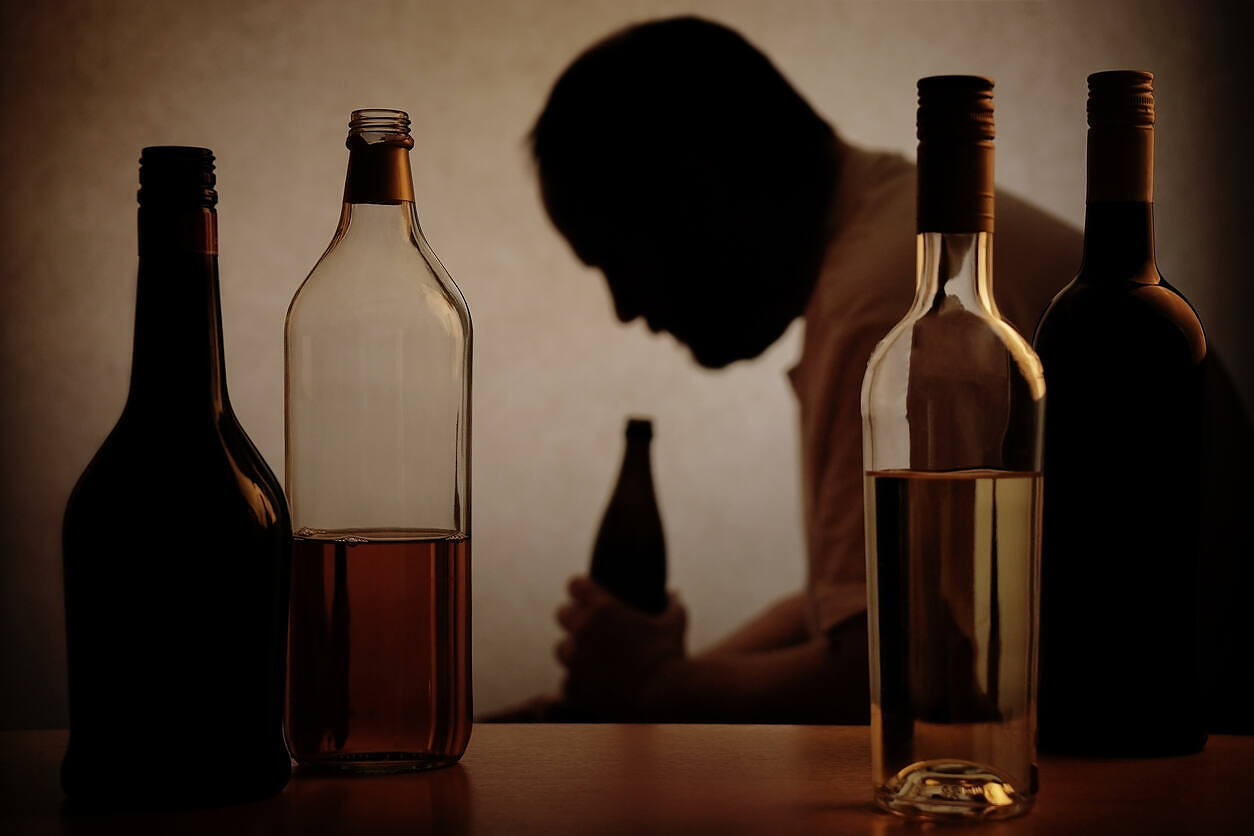
Alcohol Rehab
Alcohol rehab programs encompass both residential and outpatient treatment options for individuals struggling with alcohol addiction. To commence any program, it is crucial to undergo a medical alcohol detoxification process. This entails receiving prescription medication and guidance from a knowledgeable medical professional specialized in detoxification procedures.

Once your medical alcohol detox is complete, the remainder of the rehab program will involve therapy, treatment and planning for how to prevent you from returning to alcoholism. You will receive counselling, participate in group sessions, learn coping strategies and work on a recovery plan.
Rehab alcohol programs do vary, though, and it is essential to choose the rehab that is right for you.
The typical stay in alcohol rehabilitation is 28 days, so you should consider that the accommodation, location and approach to treatment meet your own needs and ethos.
If you are ready to end your alcohol addiction and free yourself and your loved ones from stress and worry, read on to learn more about how alcohol rehabilitation centres in the UK work and all the options available to you.

How Rehab for Alcoholism Works
Talking to a Rehab Consultant
You should talk to someone who understands alcoholism and has been through rehab before. It helps to know that what is happening to you is normal and has happened to other people before.
A rehab consultant will know what is happening to you or someone you care about and what the best next steps are. They can also listen and tell you how to get the right help and the best choices for your situation.

Choose a Rehab Centre
Alcohol Rehabs are all different, and you need to find the centre that is going to help you and fit around everything you need. There is no point in choosing any rehab you can find, so it is good to think about what you want and need.
Here are some of the things to think about:
Location
You might have an idea about where you or a loved one want to go to rehab already. Staying close by could be important to you and the people you care about. A rehab consultant can help you find a clinic near you if this is what you want. This makes it easy for your friends and family to visit and even join you for therapy or even just days out.
Perhaps you prefer to get away from everything for alcoholic rehab. If you have lots of friends and family who drink or your work and social life are one of the reasons for your alcohol problem, then this is a great idea.
There is rehab for alcoholics all over the UK, and we can help you find one that is out in the country, in a small seaside town or even abroad to enjoy a better climate for your recovery time. One of the best things about being open to rehab in another location is that you can save a lot of money by travelling to rehab with availability.
Cost of Rehab
The cost of rehab is a big part of the decision to go and which rehab to choose. rehab is an investment, and you won’t often hear people say they regret paying to recover from addiction. There is no point in choosing an extremely luxurious rehab if it will leave you with financial problems, though, so a rehab advisor can help you weigh your options.
The best choice is a rehab that is within your budget but where you will feel comfortable and happy. For some people, it is better to travel and go to a centre in a cheaper area than share a room to stay in a more expensive place. When you are in rehab, you spend a lot of time in the residential areas working on therapy and treatment, so it is good for the situation to be as close to home as it can be.
The actual price of a stay in a UK alcohol rehab can vary from £2000 to 10,000 a week, depending on all the factors mentioned above.
Treatment
The one piece of good news about alcohol addiction is that almost every rehab centre treats it. Some specialise in drugs, though, so you might prefer to go to a rehab that has more people in a similar situation to you. One thing you need to think about is the type of treatment you want, as there are lots of different approaches to alcohol recovery.
You can talk to an advisor about your or a loved one’s lifestyle, personality and beliefs because different programs suit different people. For example, if you are religious, you might prefer a treatment centre that works with your ideas and beliefs. Maybe you prefer a traditional way of stopping drinking or something more scientific, such as SMART recovery.
Going Into Alcohol Rehab
When you have made your decision about which rehab you want to go to and where you will start on your rehab journey step by step.
What happens next depends on what stage of recovery the person going into rehab is at. If you have already stopped drinking completely for a few weeks, then you can go straight into therapy. Otherwise, you will start off with a medical detox.
Before you go into the rehab, their team will call you and talk about your health, personal needs and medical history. They will tell you at this point if you are likely to need a medical detox.
What is Medical Alcohol Detox?
Most modern alcohol rehab centres use a program of rest and prescription medicines to deal with detox. You might have tried going cold turkey or tapering down your drinking before. Most people who go into rehab for drinking have tried to do one or both but found it didn’t work.
It is difficult to stop drinking on your own, especially early on when the withdrawal symptoms are happening. The prescription detox is to help you manage the symptoms safely and feel better quicker. You will still get side effects from stopping drinking, but they will be easier to cope with, and most people recover quicker with this extra help.
What Happens in Alcohol Rehab?

When you first arrive at the alcohol rehab clinic you choose, they’ll do an assessment of how you are physically and mentally. The doctor and counsellors will join you in making a treatment plan, and you can discuss what and how you want to go ahead.
You will start the detox straight away because no alcohol is allowed in any rehab clinic.
You’ll experience slight symptoms like anxiety, nausea, and vomiting several hours after your last drink. You will get some of the detox medication straight away to make sure you can rest and don’t have any dangerous side effects.
At alcohol treatment UK, they’ll have medical professionals available who can prescribe medications that’ll help with withdrawal. These can include benzodiazepines and anti-seizure drugs. Not only will these make you feel more comfortable, but they can also prevent dangerous seizures.
Addiction Therapy in Rehab
Stopping drinking and detoxing is a big mountain to climb. You might not have thought about what comes after yet. The good news is you are halfway there, and the healing part of your recovery is about to start.
Group Therapy
One of the best things about rehab is spending time with people who are experiencing the same things as you. It can be a relief to find out you aren’t alone in having this problem and airing your feelings about alcohol without judgment can be liberating. Group therapy is training for the future, too. You can practice how you will deal with the problems you will face when you leave rehab, like social situations sober, handling tough situations that make you want to drink and what to say when you feel tempted.
Counselling
Taking time to work out the ‘why’ of your alcohol addiction is one of the biggest parts of rehab recovery. People who can’t understand and take steps to deal with the things that cause them to need alcohol are more likely to relapse after leaving rehab.
You will have one-to-one sessions with your counsellor daily, at least if you are comfortable. This is your chance to talk about anything private you do not want to share in group therapy.
You can work on your mental health and plan how you are going to cope after rehab without alcohol. You don’t have to share more than you want to, and these sessions should be practical and focused on what you want to change and improve.
CBT – cognitive behaviour therapy is the most common type of therapy used in addiction rehab. This is because it is designed to help people make meaningful changes to behaviour they want to improve. Drinking alcohol to excess is a behaviour pattern and so CBT helps a lot with this kind of problem.
Lifestyle Changes in Rehab
You will spend lots of time in rehab working out why your past habits and life caused you to start drinking in a destructive way. But at some point, we have to start looking at the future, and this is where lifestyle changes come into play.
During detox, you’ll also eat healthier to promote healing and recovery. For instance, you’ll drink more water and eat more foods rich in vitamins and minerals. You may even start taking supplements, as several vitamins are very low in people who drink too much for a long period, such as vitamins B and C. These can, in fact, be the cause of many long-term alcohol withdrawal symptoms.
If you have spent a lot of your life drinking and living that lifestyle, you might wonder what you are going to do instead. Your counsellors and coaches in alcohol rehabilitation centres will guide you, but you should choose things that make you happy and where you will meet people with similar interests and lifestyles and avoid alcohol.
Rehab is your chance to try out this new lifestyle in a place where alcohol doesn’t figure into the equation. Alcohol is completely banned inside all rehab centres we work with, which makes avoiding temptation easier.
Inpatient & Outpatient Alcohol Rehab

Inpatient Treatment
Inpatient treatment means you live at the centre while you receive alcohol addiction help. This is the most effective way to recover, as you focus all your energy and time on sobriety. Plus, you can always access all the facility’s services at any time.
There are so many different kinds of alcohol rehab centres, but most fall into these broad categories:
Rural Rehab Centre
These are usually self-contained former country homes in quiet and private locations. It is ideal if you are looking to get away from life outside and helpful if you think you or a loved one might be tempted by access to alcohol locally.
Converted Urban Rehabs
If you prefer to be in a town and have access to amenities, then a more central alcohol rehab is a great choice. These can be great for visitors coming to see you and for accessing local facilities and groups. They are often based in small towns with plenty of alcohol-free activities and attractions.
Purpose Built Alcohol Rehabs
Often found in suburban areas or in the countryside, these are dedicated treatment centres with specialists and usually have some of the best facilities and therapies. They can be both residential and have separate residences where you stay with your group and a medically trained attendant. This gives a more home-like feeling and lets you separate treatment from relaxation and socialising. It can be less jarring to people who like the comforts of a separate home and don’t like the idea of staying in a hospital-like environment.
How Long is Alcohol Rehab?
The length of time you spend in alcohol rehab will depend on several factors, and while the priority should be recovery, there are of course, always other things to think about.
How Long Do You Need?
The minimum stay for detox is two weeks. You can stop drinking safely and comfortably and deal with the most severe withdrawal symptoms. Detox-only stays might sound tempting financially and timewise, but they can be false economy on both fronts. People who spend at least two weeks more in therapy for rehab are much less likely to relapse than people who simply ‘dry out’ and leave. It is not impossible to succeed without this extra time for therapy if you commit to doing it as an outpatient, but it is a risk. The cost of returning again will be much higher.
A 28-day stay in alcohol rehab is the norm; plenty of people find this manageable in cost and time spent away from home and work commitments.
Of course, how long you need depends on a few different factors.
- How severe your addiction is
- What withdrawal symptoms you have
- Mental health complications
- What treatment program you need
Sober Housing
This is an extension to your stay in rehab. It gives you extra time and access to help and a sober environment if you need it. Sober housing is cheaper than rehab and offers some of the facilities such as therapy, medical help and lifestyle support.
Outpatient Treatment
Outpatient treatment, otherwise known as ‘dayhab’ should follow a similar treatment program to residential rehab, but there are lots of variations on this type of alcohol rehab as well.
Dayhab is for people with mild alcohol addiction or people who have briefly relapsed after years of sobriety and need to get back on track.
Outpatient treatment is cheaper because you don’t have to stay and eat at the facility like inpatient treatment. This means you can continue with your normal activities. These activities include caring for your family, attending university, and working.
Outpatient treatment is helpful if you have a supportive home and your dependence is not severe. Outpatient care does not provide the best treatment for someone who is easily triggered and may relapse before completing treatment.
Aftercare for Alcohol Rehab Treatment
After rehab, knowing you’ve beaten your drinking problem and emerged victorious feels excellent. However, sobriety is lifelong, so you can’t stop after residential rehab.
Stopping drinking alcohol is a lifelong challenge, so having the right tools to handle it is essential.
Of course, you’ve got most of those tools from your counselling sessions in rehabilitation. But more comes afterwards; aftercare is essential in keeping yourself sober.
Here are the types of treatment available for you after you’ve left residential alcohol rehab treatment. These are available in both inpatient and outpatient settings.
Individual Therapy
As mentioned earlier, CBT treats several mental health issues, such as anxiety and depression. Once you’ve left rehab, keeping up with CBT is essential to maintain a reasonable frame of mind.
You may also participate in emotive behavioural therapy, a CBT type.
Group Meetings
A solid support system at home is essential, and connecting with others with similar experiences is crucial. Having people who have also had an alcohol use disorder is helpful. They understand your experience better than others.
These can be through support groups such as Alcoholics Anonymous or Narcotics Anonymous meetings.
Alternative Therapies
If you enjoyed the alternative therapies you experienced in rehab, you could continue receiving these aftercare services. They can include reflexology, reiki, massage, and meditation. These all help you with mindfulness, self-awareness, and stress relief.
How To Get Help For An Alcoholic
To help a loved one seeking treatment:
- Provide specific examples of positive reinforcement techniques that can be used to support your loved one seeking treatment. This can help them better understand how to put the advice into action and increase the likelihood of success.
- Give them information about different types of treatment options available, such as inpatient rehab, outpatient programs, and support groups. This can help them make more informed decisions about the best options.
- Emphasize the importance of self-care for a loved one with alcoholism. This can include setting boundaries, seeking support from friends or professionals, and taking time for personal hobbies and interests. By prioritizing their well-being, you can better support your loved one in the long run.
Stop Drinking With the Help of Compassionate Professionals
Deciding to stop drinking and go to an alcohol clinic is a fantastic and right step in your life. Although it might be difficult initially, achieving sobriety will be worthwhile, especially considering the valuable life skills you will gain.
The most important thing is this: always know that you don’t have to walk this path alone. You can get through the most challenging parts with knowledgeable and compassionate professionals and become stronger.
Are you looking into residential rehabilitation? Get in touch with us today.

